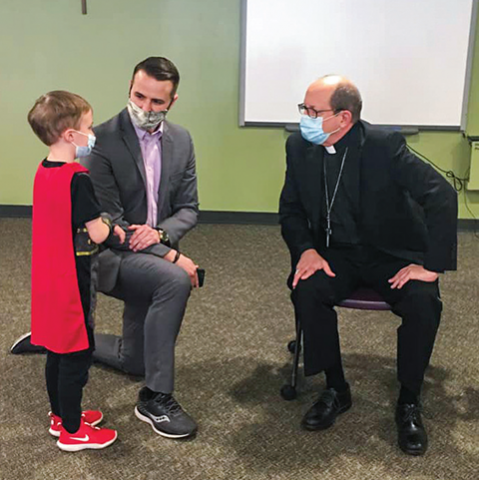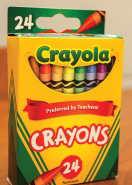
This column from Bishop David Walkowiak originally appeared in the May 2021 issue of FAITH Grand Rapids magazine.
Recently I visited Saint Thomas the Apostle Catholic School in Grand Rapids during National Reading Awareness Month. I had the opportunity to read to some of the younger students, preschool through grade 2. Reading to children can make a big difference. Reading books aloud to children stimulates their thinking and imagination. It helps them develop language and listening skills and increases their vocabulary.
I read to five groups of students. The title of the book was The Day the Crayons Quit. Many of them were already familiar with the story but were eager to hear it again. They were attentive and engaged. At the end of my reading sessions, the school rewarded me with my own box of Crayola crayons. It has been a while since I had my own set!
 |
That day was my lengthiest visit inside a school since the pandemic began last year. What struck me was how normal everything seemed. The same dynamics were in place as before, and the teachers and children easily and naturally observed the safety precautions. I was happy for them all, especially the students. In-person learning is so important. Childhood is a crucial time. Every day students are learning something new. A big part of that learning is forming healthy connections with others through socializing and friendships. Students need to spend time with their teachers, classmates, best friends and others. Now, for very good reasons, some students and teachers at this time need to teach and learn virtually, which is to be expected and is fine. But for most students, in-person learning provides the most benefit. And that’s what our Catholic schools have been doing since August.
Last spring, all schools in Michigan closed. Within a day, our schools were able to transition all students to virtual learning to ensure their continued success. This was not easy for anyone: teachers, students or parents. But at the end of the academic year, every student was promoted to the next grade. They were not left behind. They were ready to return to school in August.
During last spring and summer, the Office for Catholic Schools staff, together with principals and teachers, worked long hours to ensure a safe and prudent return to in-person instruction for this academic year. COVID-19 mitigation plans were developed, desks were spaced apart, temperature-taking and handwashing became a routine part of the school day – and it has worked! Our Catholic schools are in their final month of completing their full 180-day school year in person.
Our country seems to be growing increasingly morally confused with each passing day. Our society is becoming largely indifferent to religion in general and particularly hostile to Catholicism. That is why I want to express my praise and gratitude for the work of our pastors, school leaders and teachers. Catholic schools exist to pursue a critical mission. That mission embraces academic excellence and learning. But our schools also offer a path to moral wholeness and, ultimately, to heaven. Despite the obvious challenges of this year, our teachers were dedicated to getting back into the classroom. They are not simply professionals. They realize that their teaching is a ministry of the Church where children come first.
I also wish to thank our parents who sacrifice to send their sons and daughters to Catholic schools. You have the satisfaction of knowing that you are putting “first things first,” and that your children are being given an opportunity to be successful in the things that matter the most: knowing the Lord and serving Him with a joyful heart while discovering the Lord’s place in their lives.
Catholic schools are at the very heart of evangelization. They are instruments of grace, places where the Gospel comes alive daily, places where both students and families can encounter and engage the faith. As we approach the conclusion of another successful year of Catholic education, may we always remember the difference that faith makes in learning and in life!
Contact our admissions advocates to learn more about enrolling in a Catholic school.
Catholic schools in the Diocese of Grand Rapids are an alliance of 31 vibrant learning communities (26 elementary and five high schools) serving more than 6,000 preschool through 12th grade students throughout West Michigan. Our schools inspire young people to grow in Catholic faith and grace, achieve more in school and life, develop creativity and character, and feel welcomed and cherished for their unique gifts. We partner with parents to awaken the whole child to a world of light and life — that grows better and brighter when children reach their potential.
Instrumentos de la gracia: Las escuelas católicas enfrentaron el desafío de la pandemia
Recientemente durante el Mes Nacional de Concientización sobre la Lectura visité la Escuela de Santo Tomas Apóstol en Grand Rapids. Tuve la oportunidad de leerles a algunos de los estudiantes más jóvenes del preescolar hasta el segundo grado. Leerles a los niños puede hacer una gran diferencia. El leer libros en voz alta a los niños estimula su pensamiento y su imaginación esto les ayuda a desarrollar el lenguaje y las habilidades auditivas y aumenta su vocabulario.
Les leí a cinco grupos de estudiantes un libro titulado El Día En Que Los Crayones Renunciaron. Muchos ya estaban familiarizados con la historia, pero estaban ansiosos de escucharla otra vez. Estuvieron atentos y dispuestos. Al final de mis sesiones de lectura, la escuela me recompensó con mi propia caja de crayones marca Crayola. ¡Ha pasado un tiempo desde que tuve mi propia caja!
Ese día fue mi visita más larga a una escuela desde que comenzó la pandemia el año pasado. Lo que me sorprendió fue lo normal que parecía todo. Se mantuvo la misma dinámica que antes, los maestros y los niños observaban fácil y naturalmente las precauciones de seguridad. Me alegré por todos ellos, especialmente por los estudiantes. El aprendizaje en persona es muy importante. La infancia es un momento crucial. Todos los días, los estudiantes aprenden algo nuevo. Una gran parte de ese aprendizaje es formar conexiones saludables con los demás a través de la socialización y las amistades. Los estudiantes necesitan pasar tiempo con sus maestros, compañeros de clase, mejores amigos y demás. Ahora, por muy buenas razones, algunos estudiantes y profesores en este momento necesitan enseñar y aprender virtualmente, lo cual es de esperar y está bien. Pero para la mayoría de los estudiantes, el aprendizaje en persona brinda el mayor beneficio. Y eso es lo que nuestras escuelas católicas han estado haciendo desde agosto.
En la primavera pasada, todas las escuelas de Michigan cerraron. En un día, nuestras escuelas pudieron hacer la transición de todos los estudiantes al aprendizaje virtual para asegurar su éxito continuo. Esto no fue fácil para nadie: profesores, alumnos o padres. Pero al final del año académico, todos los estudiantes fueron promovidos al siguiente grado. No se quedaron atrás. Estaban listos para regresar a la escuela en agosto.
Durante la primavera y el verano pasado, el personal de la Oficina de las Escuelas Católicas, junto con los directores y maestros, trabajaron largas horas para asegurar un regreso seguro y prudente a la instrucción en persona para este año académico. Se desarrollaron planes de mitigación para el COVID-19, se separaron los escritorios, la toma de temperatura y el lavado de manos se convirtieron en una parte rutinaria de la jornada escolar ... y ¡ha funcionado! Nuestras escuelas católicas están en su último mes de completar su año escolar de 180 días en persona.
Nuestro país parece estar cada vez más confundido moralmente con cada día que pasa. Nuestra sociedad se está volviendo en gran medida indiferente a la religión en general y particularmente hostil al catolicismo. Por eso quiero expresar mi reconocimiento y gratitud por el trabajo de nuestros párrocos, líderes escolares y maestros. Las escuelas católicas existen para llevar a cabo una misión crítica. Esa misión abarca la excelencia académica y el aprendizaje. Pero nuestras escuelas también ofrecen un camino a la integridad moral y en última instancia, al cielo. A pesar de los desafíos obvios de este año. Nuestros maestros se dedicaron para volver a las aulas. No son simplemente profesionales, pues se dan cuenta, que su labor de enseñar es un ministerio de la Iglesia en donde los niños son lo primero.
También deseo agradecer a nuestros padres y madres quienes hacen un sacrificio al enviar a sus hijos e hijas a las escuelas católicas. Ustedes tienen la satisfacción de saber que están poniendo “en primer lugar las cosas que son esenciales” y que a sus hijos e hijas se les está dando la oportunidad de tener éxito en las cosas que más importan: conocer al Señor y servirle con un corazón gozoso mientras descubren el lugar que el Señor ocupa en sus vidas.
Las escuelas católicas están en el corazón mismo de la evangelización. Son instrumentos de la gracia, lugares donde el evangelio cobra vida día a día, lugares donde tanto los alumnos como las familias pueden encontrarse y comprometerse con la fe. A medida que nos acercamos a la conclusión de otro año exitoso de educación católica, ¡Recordemos siempre la diferencia que la fe hace en el aprendizaje y en la vida!




